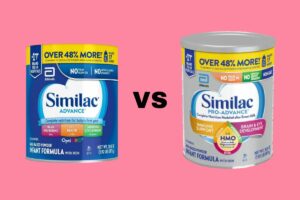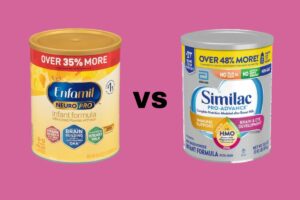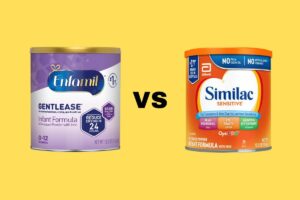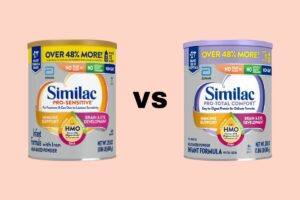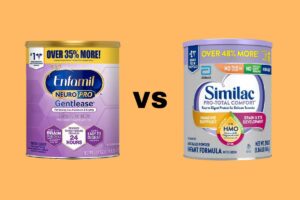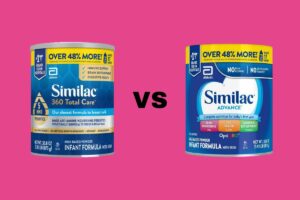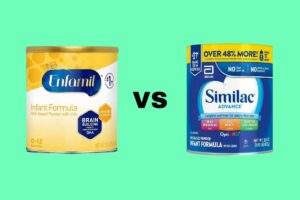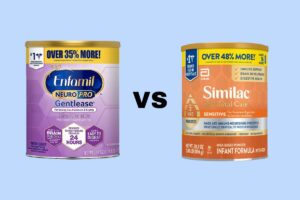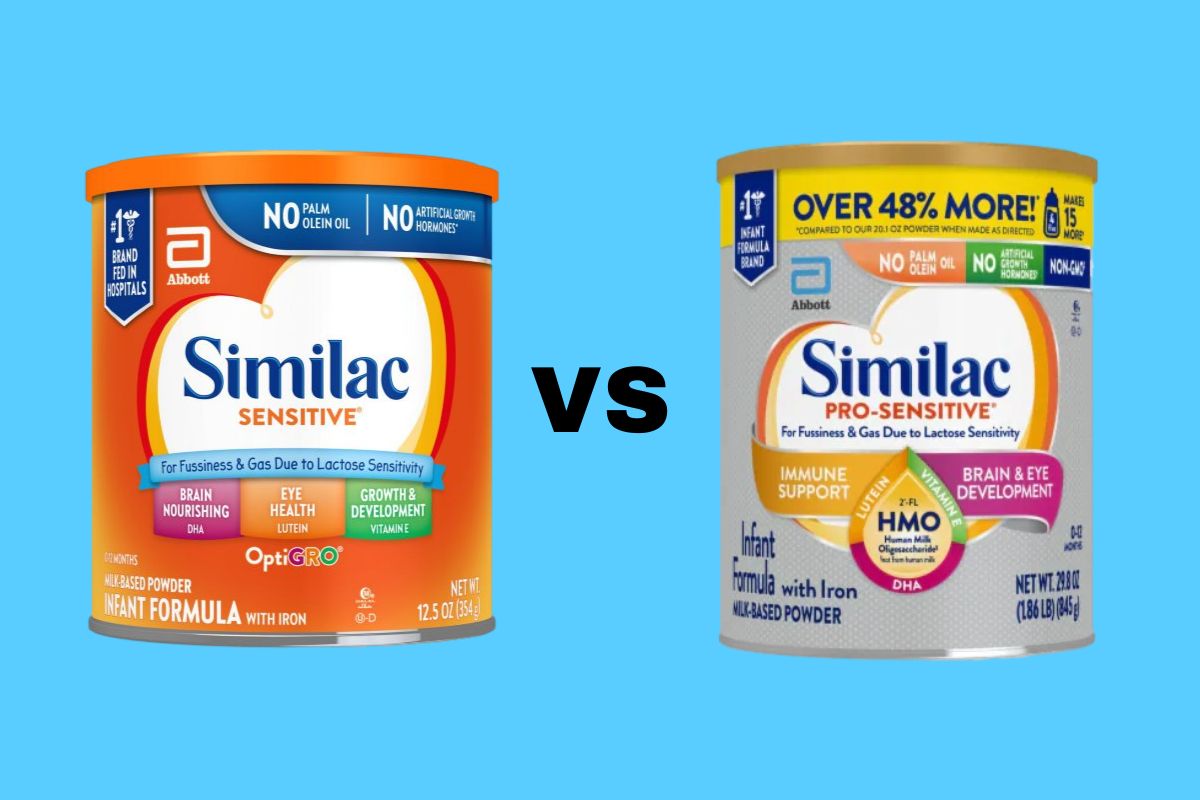
When you have a baby or you are preparing to become a parent then you have an important decision to make when it comes to feeding. You need to decide whether you are breastfeeding or formula feeding your baby, or doing a mixture of both.
If you decide to use formula, either for all of the feeding or part of it, then you need to choose which product you are going to buy.
Choosing the right formula is an important decision as this will be your baby’s main source of nutrition for the first year or so of their life, or until you decide to wean them onto solid foods.
You need to make sure that you choose a formula that contains all of the necessary ingredients to support your baby’s development, but one that also agrees with their digestive system.
Similac is one of the best-selling brands of baby formula. They offer a range of products, but the two we are going to be looking at today are the Sensitive Formula and the Sensitive Pro Formula.
They sound very similar, so what are the differences between the two products? And which one is better?
If you want to know more about these two types of Similac formulas then keep reading. We have put together this guide to help you decide which one would be better for your baby.
Why Should You Use A Sensitive Formula?
Sensitive formulas are designed to be super easy for your baby’s system to digest.
This makes it easier for your baby to make the most of all of the beneficial ingredients in the formula that will help them to grow and develop, even if your baby has a sensitive stomach or certain intolerances.
In the first year of a baby’s life, there are lots of different things that could cause them to get an upset stomach or excessive wind during or after a feed – lactose sensitivity or intolerance, galactosemia (inability to process galactose), allergies to certain proteins, and many others.
Using a sensitive formula can help to relieve these issues.
If you are unsure whether you should use a sensitive formula then you should speak to your child’s doctor or a pediatrician.
What Are The Similarities Between Similac Sensitive And Sensitive Pro?
Before we look at what sets these two formulas apart, you need to understand the things that the two products have in common:
Milk-Based
Both of these formulas are milk-based and will have the appearance of milk once they have been prepared.
Easy To Digest
Both the sensitive and the sensitive pro formulas have been designed to be very easy to digest even if your baby has a sensitive stomach.
Common Ingredients
There are certain ingredients that both formulas have in common. They both contain vitamin E, omega 3, lutein, and docosahexaenoic acid.
These ingredients are blended to create OPtiGro, Similac’s ideal combination for supporting brain and eye development as well as a healthy immune system.
Both formulas also contain milk protein isolate, sunflower oil, corn syrup, sugar, coconut oil, and soy oil.
They also both contain an oligosaccharide which is found in human breast milk. This natural ingredient is important for developing your baby’s immune system as well as helping them to have a healthy gut and efficient brain cognition.
Recipe
The amounts of most nutrients, vitamins, and minerals are almost the same in both products, apart from inositol which we will explain later.
Complete Nutrition
Both of these formulas are a complete nutrition option which means you don’t have to supplement them with anything else. They contain everything that your baby needs to grow and be healthy.
Lactose Sensitive
If your baby is sensitive to lactose then they can use either of these formulas and it will reduce their wind and discomfort. It fills the nutritional gaps left by the absence of lactose.
It is also great for babies who experience mild spit-up or become sick after feeding.
No Harmful Ingredients
These formulas contain no artificial growth hormones and no palm oil – a known contributor to constipation in babies. There are also no GMOs in either formula.
Galactose
Both formulas contain galactose which means they are not suitable for babies with galactosemia.
Nucleotides And ARA
Both formulas contain nucleotides which are important for supporting metabolic functions in the body.
They also contain ARA which is vital for developing the nervous system, the immune system, and the skeletal system.
Age Range
Both products are suitable for newborn babies up to babies that are 12 months old. By this point, you should have begun to wean them onto solid foods.
Not Organic
Neither of these formulas is organic, which means it is not suitable for families who want to give their baby a 100% organic diet.
Difference Between Similac Sensitive And Sensitive Pro

Now that you know what makes the products alike, it is time to consider how they are different.
The differences between the two types of the formula are ultimately what is going to help you to choose between them:
Price
Similac sensitive tend to be slightly cheaper than Sensitive Pro. However, this depends on where you buy it from.
Ingredients
Whilst the ingredients are very similar, there are a few differences. Sensitive Pro also contains a lot more inositol than Similac sensitive. Inositol is a type of sugar that is found predominantly in the brain.
It is used to aid the messages transmitted by brain cells which tell the body to release certain hormones to stimulate healthy growth.
Recalls
Sensitive Pro has never been recalled, but there have been several occurrences of product recalls for Similac Sensitive.
Downsides
Customers report different downsides for each product. Some parents found Similac Sensitive to be too foamy once it was prepared. Sensitive Pro caused mild constipation for some babies.
Which Formula Is Better?
There is no simple answer to which product is better as it depends on your priorities.
Similac Sensitive is cheaper, so if you are on a tight budget then this could be the best option. However, it contains less inositol than Sensitive Pro.
It also has a more foamy consistency which some babies might not like. There have been previous issues with product recalls, but these seem to have been resolved.
Sensitive Pro may cost a little more, but you are paying for the benefit of a higher inositol concentration which will help your baby’s development.
The product has never been recalled, but some parents found that his formula gave their babies constipation.
Both formulas offer complete nutrition to babies from newborn up to 12 months old.
This means that whichever one you choose will not need to be added to other products or nutritional supplements- it is the only thing that you will need to feed your baby until you start them on solid foods.
Both formulas are suitable to be used alongside breast milk, so if you are breastfeeding or pumping as well as using formula then you can use either product.
Both products are also suitable for babies with an intolerance to lactose.
How Should You Decide Which Formula To Buy?
You can plan and research as much as you like, but you don’t know how your baby is going to react to the formula until you try and give it to them.
It is best to buy a small amount of each formula and feed them to your baby a day apart.
One formula might be better suited to their digestive system than the other. If their reaction to both formulas is the same then you need to decide between them.
If you are on a tight budget and saving money is your priority then go for the Similac Sensitive.
If you can afford either product then you might as well go for the Similac Sensitive Pro, as it has all of the benefits of the Similac Sensitive but with the extra ingredient of inositol which will help your baby’s development.
Alternatives:
- Similac Pro Sensitive Vs Pro Total Comfort
- Enfamil Enspire Vs Neuropro
- Enfamil Neuropro VS Gentlease
Summary
Choosing a formula is an important decision and one that you should not take lightly.
The formula you choose to feed your baby will be the main if not the only source of nutrition that they have up until they start to eat solid foods.
You need to make sure that your baby is getting everything they need and that the formula you give them does not upset their stomach.
You could choose either of these formulas and feel confident that all of your baby’s nutritional needs are being met.
You can also be sure that the symptoms of their lactose sensitivity will be eased. Both products are made by Similac who are a trusted and well-established brand.
Ultimately you need to decide what your priorities are as a parent in order to choose between the two products, but if you can afford Similac Sensitive Pro then this is what we would recommend.

Carly Link, a 33-year old mother of two toddlers. She is a parent and goes through a lot of the usual parenting difficulties herself. Carly shares all her experiences and knowledge about the best baby products through this blog.
